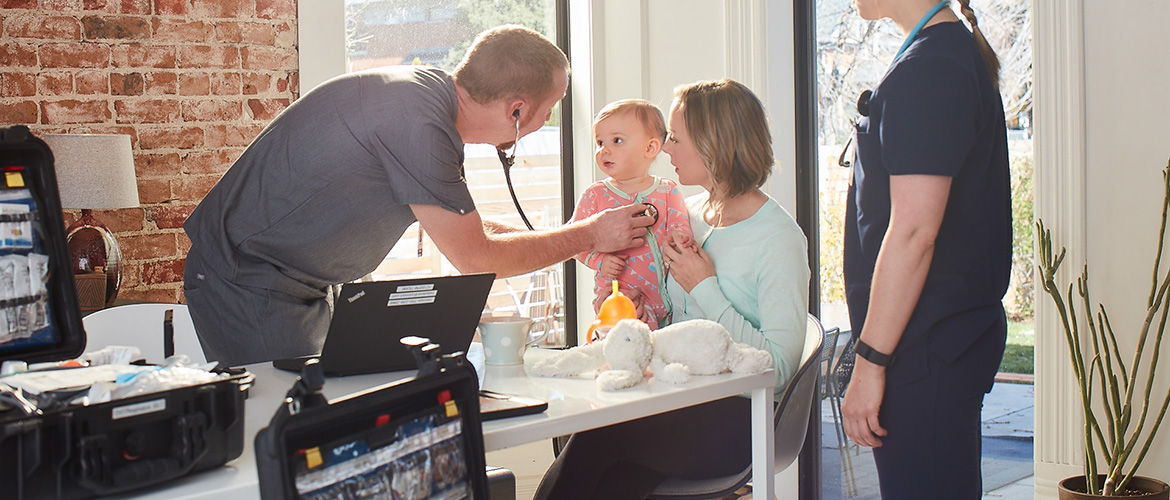A single mother of three young children becomes ill around 7:30 p.m. Her doctor’s office is closed.
Her choices may include caring for herself as best she can or loading up her kids, finding an emergency room or urgent care and waiting to be treated, while risking exposure to infections such as the coronavirus that causes COVID-19.
However, in the Oklahoma City-area, a third option allows Blue Cross and Blue Shield members to get for treatment for acute, non-life-threatening conditions at their homes. DispatchHealth, a mobile medical care company, provides on-demand house calls at in-network benefit levels.
[Note: Members should call the customer service number on their benefit card for copay and deductible information.]
DispatchHealth’s medical teams are made up of medical technicians, nurse practitioners and physician assistants. They assess and treat common medical conditions, including dehydration, minor injuries, asthma and urinary tract infections. They also perform procedures such as starting intravenous fluids and medications, draining abscesses, splinting and casting injuries, and stitching wounds.
“These things make a difference in people’s lives,” says Joseph R. Cunningham, M.D., president of Blue Cross and Blue Shield of Oklahoma. “I’m a big believer in simpler care. The last thing we want to do is have anyone in the ER who didn’t need to be there.”
Efficient and safe care
Most health needs don’t require the level of care that ERs are designed to deliver — and ER visits are often expensive, even for people with insurance. Plus, visiting any kind of health care facility carries the risk of exposure to viruses and bacteria that cause infections and illnesses.
With the spread of COVID-19, federal health officials are encouraging health care providers to postpone routine and non-urgent visits to their offices and clinics. They’re instead encouraging patients to pursue other ways of getting the care and advice they need, such as nurse lines and telemedicine.
Mobile medical clinics offer the levels of treatment children and adults need, while allowing them to remain in the comfort and safety of their homes. The medical teams wear masks, booties and gloves during visits, and they sanitize kits and devices during and between visits to prevent infection.
“Even apart from when we’re in a pandemic, it’s easy to conceptualize why this is a needed service,” says Drew Dawkins, a nurse practitioner and DispatchHealth’s regional leader of advanced practice providers. “When you can keep people at home, you provide a better level of service. People feel safe there.”
Stitching a cut, which can seem scary to a kid, becomes less stressful if it can be done as the child sits next to his dog on a couch in his home, Dawkins says.
“Simple things like that lead to better outcomes and better care,” he says. “We’ve got a lot of individuals who are recognizing how easy home acute care can be.”
Changing behavior
Health care is a fast-growing part of America’s on-demand economy for goods and services, including ride-hailing, meal kits and groceries. In 2019, the sector was valued at $110 billion, according to the market research firm Rockbridge Associates.
DispatchHealth can be reached by phone, smartphone app or through its website, and medical teams provide care 8 a.m. to 10 p.m. daily, even on holidays. Response times depend on the number of teams available and time of year, Dawkins says, adding that cold and flu season tends to stretch the company's resources.
“People don’t mind waiting because they are waiting at home, not in an ER, where they can become more irritated,” he says.
Ordinarily, urinary tract infections are the most common reason people contact DispatchHealth, Dawkins says. But these days, more patients want diagnosis and treatment for what may be COVID-19-related symptoms, including fever and coughs, he says. Although the company can’t test for COVID-19, medical teams provide treatment to relieve their symptoms and check for other conditions such as influenza and strep throat.
“If you can be seen, diagnosed and treated in your home, why would you go to an emergency room, where you could be at risk of infection?” Cunningham asks. “People have been conditioned to go to the ER. DispatchHealth is changing their behavior.”

